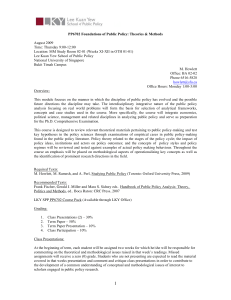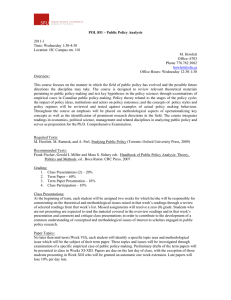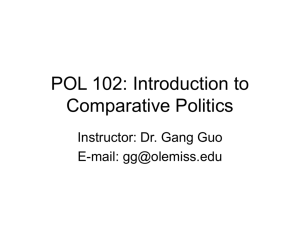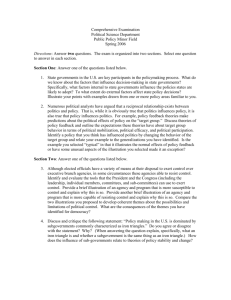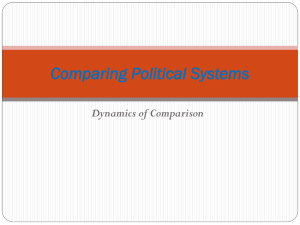Document 10673941
advertisement
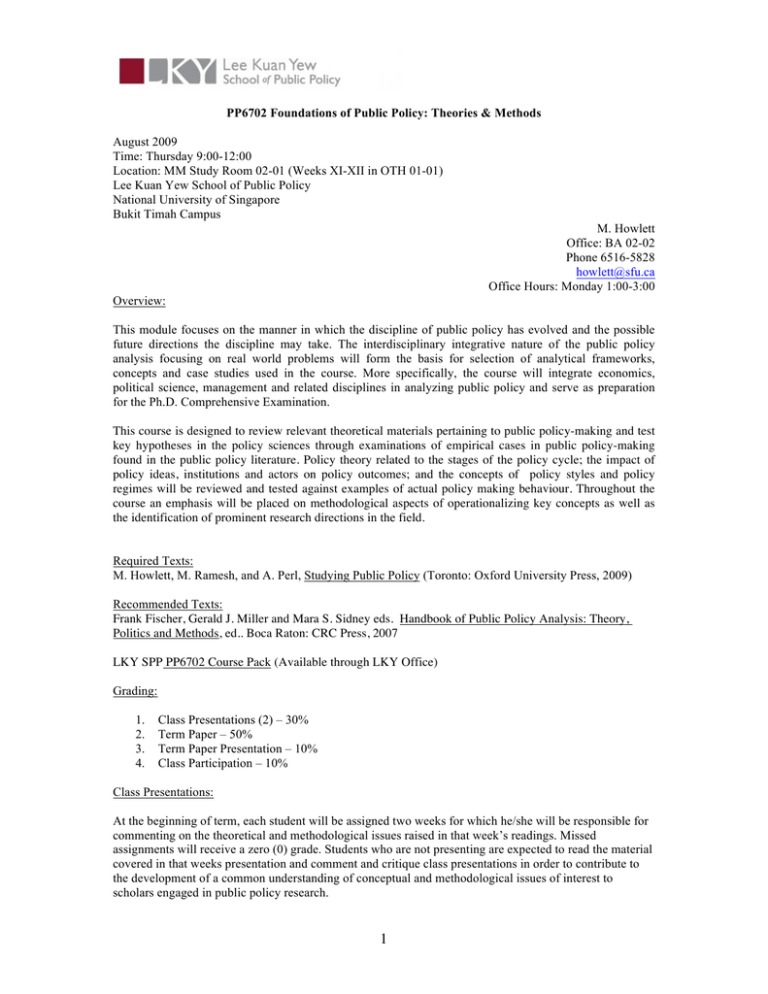
PP6702 Foundations of Public Policy: Theories & Methods August 2009 Time: Thursday 9:00-12:00 Location: MM Study Room 02-01 (Weeks XI-XII in OTH 01-01) Lee Kuan Yew School of Public Policy National University of Singapore Bukit Timah Campus M. Howlett Office: BA 02-02 Phone 6516-5828 howlett@sfu.ca Office Hours: Monday 1:00-3:00 Overview: This module focuses on the manner in which the discipline of public policy has evolved and the possible future directions the discipline may take. The interdisciplinary integrative nature of the public policy analysis focusing on real world problems will form the basis for selection of analytical frameworks, concepts and case studies used in the course. More specifically, the course will integrate economics, political science, management and related disciplines in analyzing public policy and serve as preparation for the Ph.D. Comprehensive Examination. This course is designed to review relevant theoretical materials pertaining to public policy-making and test key hypotheses in the policy sciences through examinations of empirical cases in public policy-making found in the public policy literature. Policy theory related to the stages of the policy cycle; the impact of policy ideas, institutions and actors on policy outcomes; and the concepts of policy styles and policy regimes will be reviewed and tested against examples of actual policy making behaviour. Throughout the course an emphasis will be placed on methodological aspects of operationalizing key concepts as well as the identification of prominent research directions in the field. Required Texts: M. Howlett, M. Ramesh, and A. Perl, Studying Public Policy (Toronto: Oxford University Press, 2009) Recommended Texts: Frank Fischer, Gerald J. Miller and Mara S. Sidney eds. Handbook of Public Policy Analysis: Theory, Politics and Methods, ed.. Boca Raton: CRC Press, 2007 LKY SPP PP6702 Course Pack (Available through LKY Office) Grading: 1. 2. 3. 4. Class Presentations (2) – 30% Term Paper – 50% Term Paper Presentation – 10% Class Participation – 10% Class Presentations: At the beginning of term, each student will be assigned two weeks for which he/she will be responsible for commenting on the theoretical and methodological issues raised in that week’s readings. Missed assignments will receive a zero (0) grade. Students who are not presenting are expected to read the material covered in that weeks presentation and comment and critique class presentations in order to contribute to the development of a common understanding of conceptual and methodological issues of interest to scholars engaged in public policy research. 1 Paper Topics: No later than mid-term (Week VII), each student will identify a specific topic area and methodological issue which will be the subject of their term paper. These topics and issues will be investigated through examination of a specific empirical case of public policy-making. Preliminary drafts of the term papers will be presented to class in Weeks XI-XIII. Papers are due on the last day of class, with the exception of those students presenting in Week XIII who will be granted an automatic one week extension. Late papers will lose 10% per day late. Weekly Topics and Reading List Week I – Introduction and Administration: Theories of Public Policy-Making Overview: Howlett, Michael, Anthony Perl and M. Ramesh. Studying Public Policy: Policy Cycles and Policy Subsystems. Toronto: Oxford University Press, 2009 Chapters 1 & 2 Jann, Werner, and Kai Wegrich. 2007. "Theories of the Policy Cycle." In Handbook of Public Policy Analysis: Theory, Politics and Methods, ed. Frank Fischer, Gerald J. Miller and Mara S. Sidney. Boca Raton: CRC Press, 43-62. Approaches: Sabatier, Paul A. Theories of the Policy Process. Boulder: Westview Press, 1999. Birkland, Thomas A. An Introduction to the Policy Process; Theories, Concepts, and Models of Public Policy Making. Armonk: M.E. Sharpe, 2001. Dobuzinskis, Laurent, Michael Howlett, and David Laycock, ed. Policy Studies in Canada: The State of the Art. Toronto: University of Toronto Press, 1996. Background Reading: ** Students who are unfamiliar with the following concepts should cover the associated readings listed below prior to the start of the second class. a. Policy Analysis and Policy Studies: Garson, G. David. “From Policy Science to Policy Analysis: A Quarter Century of Progress.” In W. N. Dunn, ed(s), Policy Analysis: Perspectives, Concepts, and Methods, Greenwich, Conn.: JAI Press, 1986. 3-22. Hawkesworth, Mary. “Epistemology and Policy Analysis.” In W. Dunn and R. M. Kelly, ed(s), Advances in Policy Studies, New Brunswick: Transaction Press, 1992. 291-329. Torgerson, Douglas. “Between Knowledge and Politics: Three Faces Of Policy Analysis.” Policy Sciences. 19, no. 1 (1986): 33-59. 2 Webber, David J. “Analyzing Political Feasibility: Political Scientists' Unique Contribution to Policy Analysis.” Policy Studies Journal. 14, no. 4 (1986): 545-554. b. Policy Cycles: Lyden, Fremont J., George A. Shipman, and Robert W. Wilkinson. “Decision-Flow Analysis: A Methodology for Studying the Public Policy-Making Process.” In P. P. Le Breton, ed(s), Comparative Administrative Theory, Seattle: University of Washington Press, 1968. 155-168. deLeon, Peter. “The Stages Approach to the Policy Process: What Has It Done? Where Is It Going?” In P. A. Sabatier, ed(s), Theories of the Policy Process, Boulder: Westview, 1999. 19-34. Sabatier, Paul A. “Toward Better Theories of the Policy Process.” PS: Political Science and Politics. 24, no. 2 (1991): 144-156. Skok, J. E. 1995. "Policy Issue Networks and the Public Policy Cycle: A Structural-Functional Framework for Public Administration." Public Administration Review 55 (4): 325-32. c. Policy Regimes Esping-Andersen, Gosta. “Power and Distributional Regimes.” Politics and Society. 14, no. 2 (1985): 223-256. Orren, Karen and Stephen Skowronek. “Regimes and Regime Building in American Government: A Review of Literature on the 1940s.” Political Science Quarterly. 113, no. 4 (1998-99): 689-702. Eisner, Marc Allen. “Discovering Patterns in Regulatory History: Continuity, Change and Regulatory Regimes.” Journal of Policy History. 6, no. 2 (1994): 157-187. Arts, Bas, and Jan Van Tatenhove. 2000. "Environmental Policy Arrangements: A New Concept." In Global and European Polity? Organizations, Policies, Contexts, ed. Henri Goverde. Aldershot: Ashgate, 223-237. Wilson, Carter A. “Policy Regimes and Policy Change.” Journal of Public Policy. 20, no. 3 (2000): 247-271. d. Policy Subsystems Jordan, A. Grant. “Iron Triangles, Woolly Corporatism and Elastic Nets: Images of the Policy Process.” Journal of Public Policy. 1, no. 1 (1981): 95-123. McCool, Daniel. “The Subsystem Family of Concepts: A Critique and a Proposal.” Political Research Quarterly. 51, no. 2 (1998): 551-570. Burstein, Paul. “Policy Domains: Organization, Culture and Policy Outcomes.” Annual Review of Sociology. 17(1991): 327-350. Knoke, David. “Networks as Political Glue: Explaining Public Policy-Making.” In W. J. Wilson, ed(s), Sociology and the Public Agenda, London: Sage, 1993. 164-184. 3 Week II – Policy Cycles: Agenda-Setting Overview: Howlett, Michael, Anthony Perl and M. Ramesh. Studying Public Policy: Policy Cycles and Policy Subsystems. Toronto: Oxford University Press, 2009 Ch 4 Birkland, Thomas A., 2007. "Agenda Setting in Public Policy" In Handbook of Public Policy Analysis: Theory, Politics and Methods, ed. Frank Fischer, Gerald J. Miller and Mara S. Sidney. Boca Raton: CRC Press, 63-78. Theories: Baumgartner, Frank R. and Bryan D. Jones. Agendas and Instability in American Politics. Chicago: University of Chicago Press, 1993. Kingdon, John W. Agendas, Alternatives and Public Policies. Boston: HarperCollins College Publishers, 1995. Cobb, R., J.K. Ross, and M.H. Ross. “Agenda Building as a Comparative Political Process.” American Political Science Review. 70, no. 1 (1976): 126-138. Methods: Baumgartner, F. R., and B. D. Jones. 1991. "Agenda Dynamics and Policy Subsystems." Journal of Politics 53 (4): 1044-74. Howlett, Michael. “Issue-Attention and Punctuated Equilibria Models Reconsidered: An Empirical Examination of the Dynamics of Agenda-Setting in Canada.” Canadian Journal of Political Science. 30, no. 1 (1997): 3-29. Howlett, Michael. “Predictable and Unpredictable Policy Windows: Issue, Institutional and Exogenous Correlates of Canadian Federal Agenda-Setting.” Canadian Journal of Political Science. 31, no. 3 (1998): 495-524. Birkland, T. A. 2004. "'the World Changed Today': Agenda-Setting and Policy Change in the Wake of the September 11 Terrorist Attacks." Review of Policy Research 21 (2): 179-200. Birkland, T. A. 1998. "Focusing Events, Mobilization, and Agenda Setting." Journal of Public Policy 18 (1): 53-74. Week III - Policy Cycles: Formulation Overview: Howlett, Michael, Anthony Perl and M. Ramesh. Studying Public Policy: Policy Cycles and Policy Subsystems. Toronto: Oxford University Press, 2009 Ch 5 Mara S. Sidney, 2007. "Policy Formulation: Design and Tools." In Handbook of Public Policy Analysis: Theory, Politics and Methods, ed. Frank Fischer, Gerald J. Miller and Mara S. Sidney. Boca Raton: CRC Press, 79-87. 4 Theories: Linder, Stephen H. and B. Guy Peters. “Policy Formulation and the Challenge of Conscious Design.” Evaluation and Program Planning. 13(1990): 303-311. deLeon, Peter. “Policy Formulation: Where Ignorant Armies Clash By Night.” Policy Studies Review. 11, no. 3/4 (1992): 389-405. Weiss, Carol H. “Research for Policy's Sake: The Enlightenment Function of Social Science Research.” Policy Analysis. 3, no. 4 (1977): 531-545. Howlett, Michael. 2009. "Policy Analytical Capacity and Evidence-Based Policy-Making: Lessons from Canada." Canadian Public Administration 52 (2). 153-175 Mayer, I., P. Bots, and E. v. Daalen. 2004. "Perspectives on Policy Analysis: A Framework for Understanding and Design." International Journal of Technology, Policy and Management 4 (1): 169-91. Methods: Howlett, Michael and Evert Lindquist. “Policy Analysis and Governance: Analytical and Policy Styles in Canada.” Journal of Comparative Policy Analysis. 6, no. 3 (2004): 225-249. Zahariadis, Nikoloas and Christopher S. Allen. “Ideas, Networks, and Policy Streams: Privatization in Britain and Germany.” Policy Studies Review. 14, no. 1/2 (1995): 71-98. Whiteman, D. 1985. "The Fate of Policy Analysis in Congressional Decision Making: Three Types of use in Committees." Western Political Quarterly 38 (2): 294-311. Landry, Rejean, Moktar Lamari, and Nabil Amara. “The Extent and Determinants of the Utilization of University Research in Government Agencies.” Public Administration Review. 63, no. 2 (2003): 192-205. Boaz, A., and R. Pawson. 2005. "The Perilous Road from Evidence to Policy: Five Journeys Compared." Journal of Social Policy 34 (2): 175-94. Week IV – Policy Cycles: Decision-Making Overview: Howlett, Michael, Anthony Perl and M. Ramesh. Studying Public Policy: Policy Cycles and Policy Subsystems. Toronto: Oxford University Press, 2009 Ch 6 Clinton J. Andrews, 2007. "Rationality in Policy Decision Making." In Handbook of Public Policy Analysis: Theory, Politics and Methods, ed. Frank Fischer, Gerald J. Miller and Mara S. Sidney. Boca Raton: CRC Press, 43-62. Theories: Simon, Herbert A. “The Structure of Ill Structured Problems.” Artificial Intelligence. 4(1973): 181-201. Lindblom, Charles E. “The Science of Muddling Through.” Public Administration Review. 19, no. 2 (1959): 79-88. 5 Smith, Gilbert and David May. “The Artificial Debate Between Rationalist and Incrementalist Models of Decision-Making.” Policy and Politics. 8, no. 2 (1980): 147-161. Cohen, M., J. March, and J. Olsen. “A Garbage Can Model of Organizational Choice.” Administrative Science Quarterly. 17, no. 1 (1972): 1-25. Teisman, Geert R. “Models for Research into Decision-Making Processes: On Phases, Streams and Decision-Making Rounds.” Public Administration. 78, no. 4 (2000): 937-956 Weiss, Carol H. “Knowledge Creep and Decision Accretion.” Knowledge: Creation, Diffusion, Utilization. 1, no. 3 (1980): 381-404. Methods: Goodwin, Paul. 2009. "Common Sense and Hard Decision Analysis: Why might they Conflict?" Management Decision 47 (3): 427-40. Kahneman, Daniel and Amos Tversky. “Prospect Theory: An Analysis of Decision Under Risk.” Econometrica. 47(1979): 263-289. Mintz, Alex and Nehemia Geva. “The PoliHeuristic Theory of Foreign Policy Decision Making.” In N. Geva and A. Mintz, ed(s), Decision-Making in War and Peace: The Cognitive-Rational Debate, Boulder: Lynne Rienner, 1997. Bendor, Jonathan, Terry M. Moe, and Kenneth W. Shotts. “Recycling the Garbage Can: An Assessment of the Research Program.” American Political Science Review. 95, no. 1 (2001): 169190. Howlett, Michael. 2007. Analyzing Multi-Actor, Multi-Round Public Policy Decision-Making Processes in Government: Findings from Five Canadian Cases. Canadian Journal of Political Science 40 (3):659-684. Week V – Policy Cycles: Implementation Overview; Howlett, Michael, Anthony Perl and M. Ramesh. Studying Public Policy: Policy Cycles and Policy Subsystems. Toronto: Oxford University Press, 2009 Ch 7 Helga Puzl and Oliver Treib, 2007. "Implementing Public Policies." In Handbook of Public Policy Analysis: Theory, Politics and Methods, ed. Frank Fischer, Gerald J. Miller and Mara S. Sidney. Boca Raton: CRC Press, 89-108. Theories: Goggin, Malcolm L. et al. Implementation Theory and Practice: Toward A Third Generation. Glenview: Scott, Foresman/Little, Brown, 1990. O'Toole, Laurence J. “Research on Policy Implementation: Assessment and Prospects.” Journal of Public Administration Research and Theory. 10, no. 2 (2000): 263-288. Hood, Christopher. The Tools of Government. Chatham: Chatham House Publishers, 1986. 6 Salamon, Lester M., ed. The Tools of Government: A Guide to the New Governance. New York: Oxford University Press, 2002. Howlett, Michael. “Managing the "Hollow State": Procedural Policy Instruments and Modern Governance.” Canadian Public Administration. 43, no. 4 (2000): 412-431. Eliadis, Pearl, Margaret Hill, and Michael Howlett, ed. Designing Government: From Instruments to Governance. Montreal: McGill-Queen's University Press, 2004. Methods Sabatier, Paul A. “Top-Down and Bottom-Up Approaches to Implementation Research: A Critical Analysis and Suggested Synthesis.” Journal of Public Policy. 6(1986): 21-48. Hawkins, Keith and John M. Thomas. “Making Policy in Regulatory Bureaucracies.” In K. Hawkins and J. M. Thomas, ed(s), Making Regulatory Policy, Pittsburgh: University of Pittsburgh Press, 1989. 3-30. Milward, H. Brinton and Gary L. Walmsley. “Policy Subsystems, Networks and the Tools of Public Management.” In R. Eyestone, ed(s), Public Policy Formation, Greenwich: JAI Press, 1984. 3-25. McCubbins, Mathew D. and Arthur Lupia. “Learning from Oversight: Fire Alarms and Policy Patrols Reconstructed.” Journal of Law, Economics and Organization. 10, no. 1 (1994): 96-125. Scholz, John T. “Cooperative Regulatory Enforcement and the Politics of Administrative Effectiveness.” American Political Science Review. 85, no. 1 (1991): 115-136. Week VI – Policy Cycles: Evaluation Overview; Howlett, Michael, Anthony Perl and M. Ramesh. Studying Public Policy: Policy Cycles and Policy Subsystems. Toronto: Oxford University Press, 2009 Ch 8 Hellmut Wollmann, 2007. "Policy Evaluation and Evaluation Research." In Handbook of Public Policy Analysis: Theory, Politics and Methods, ed. Frank Fischer, Gerald J. Miller and Mara S. Sidney. Boca Raton: CRC Press, 393-404. Theories: Nachmias, David. Public Policy Evaluation: Approaches and Methods. New York: St. Martin's Press, 1979. Patton, Carl V. and David S. Sawicki. Basic Methods of Policy Analysis and Planning. Englewood Cliffs, NJ: Prentice Hall, 1993. Palumbo, Dennis J. The Politics of Program Evaluation. Beverly Hills: Sage, 1987. Weimer, David L. and Aidan R. Vining. Policy Analysis: Concepts and Practice. New Jersey: Prentice Hall, 1999. 7 Bennett, C. J., and M. Howlett. 1992. "The Lessons of Learning: Reconciling Theories of Policy Learning and Policy Change." Policy Sciences 25 (3) 275-94. Geva-May, Iris. “When the Motto is 'Till Death Do Us Part": The Conceptualization and the Craft of Termination in the Public Policy Cycle.” International Journal of Public Administration. 24, no. 3 (2001): 263-288. Methods: Kirkpatrick, Susan E., James P. Lester, and Mark R. Peterson. “The Policy Termination Process: A Conceptual Framework and Application to Revenue Sharing.” Policy Studies Review. 16, no. 1 (1999): 209-236. Hahn, Robert W. and Patrick Dudley. How Well Does the Government Do Cost-Benefit Analysis. Washington D.C.: AEI-Brookings Joint Centre for Regulatory Studies Working Paper, 2004 Gunton, Thomas. “Megaprojects and Regional Development: Pathologies in Project Planning.” Regional Studies. 37, no. 5 (2003): 505-519. Jung, Tobias, and Sandra M. Nutley. 2008. Evidence and Policy Networks: the UK Debate about Sex Offender Community Notification. Evidence & Policy 4 (2):187-207. Rossouw, N., and K. Wiseman. 2004. "Learning from the Implementation of Environmental Public Policy Instruments After the First Ten Years of Democracy in South Africa." Impact Assessment and Project Appraisal 22 (2): 131-40. Week VII - Policy Styles and Policy Change Overview: Howlett, Michael, Anthony Perl and M. Ramesh. Studying Public Policy: Policy Cycles and Policy Subsystems. Toronto: Oxford University Press, 2009 Ch 9 Capano, Giliberto. 2009. "Understanding Policy Change as an Epistemological and Theoretical Problem”, Journal of Comparative Policy Analysis: Research and Practice 11 (1): 7-31. Baumgartner, F. R., and B. D. Jones. 2002. "Positive and Negative Feedback in Politics." In Policy Dynamics, ed. F. R. Baumgartner and B. D. Jones. Chicago: University of Chicago Press. Clemens, Elisabeth S. and James M. Cook. “Politics and Institutionalism: Explaining Durability and Change.” Annual Review of Sociology. 25(1999): 441-466. Theories: Richardson, Jeremy, Gunnel Gustafsson, and Grant Jordan. “The Concept of Policy Style.” In J. J. Richardson, ed(s), Policy Styles in Western Europe, London: George Allen and Unwin, 1982. 116. Freeman, Gary P. “National Styles and Policy Sectors: Explaining Structured Variation.” Journal of Public Policy. 5, no. 4 (1985): 467-496. True, J. L., B. D. Jones, and F. R. Baumgartner. 1999. "Punctuated-Equilibrium Theory: Explaining Stability and Change in American Policymaking." In Theories of the Policy Process, ed. P. A. Sabatier. Boulder: Westview Press, 97-115. 8 Howlett, M., and J. Rayner. 2006. Understanding the Historical Turn in the Policy Sciences: A Critique of Stochastic, Narrative, Path Dependency and Process-Sequencing Models of PolicyMaking over Time. Policy Sciences 39 (1):1-18. Methods: Jones, B. D., F. R. Baumgartner, and J. L. True. 1998. "Policy Punctuations: U.S. Budget Authority, 1947-1995." The Journal of Economic Literature 60 (1): 1-33. Jones, B. 1994. "A Change of Mind Or A Change of Focus? A Theory of Choice Reversals in Politics." Journal of Public Administration Research and Theory 4 (2): 141-78. Cashore, Benjamin, and Michael Howlett. 2007. Punctuating Which Equilibrium? Understanding Thermostatic Policy Dynamics in Pacific Northwest Forestry. American Journal of Political Science 51 (3). Kagan, Robert A. “Adversarial Legalism and American Government.” Journal of Policy Analysis and Management. 10, no. 3 (1991): 369-406. Kagan, Robert A. “Should Europe Worry About Adversarial Legalism?” Oxford Journal of Legal Studies. 17, no. 2 (1997): 165-183. Kagan, Robert A. and Lee Axelrad. “Adversarial Legalism: An International Perspective.” In P. S. Nivola, ed(s), Comparative Disadvantages? Social Regulations and the Global Economy, Washington D.C.: Brookings Institution Press, 1997. 146-202. Howlett, Michael. “Beyond Legalism? Policy Ideas, Implementation Styles and Emulation-Based Convergence in Canadian and U.S. Environmental Policy.” Journal of Public Policy. 20, no. 3 (2000): 305-329. Week VIII– Policy Regimes: Role of Ideas Overview; Howlett, Michael, Anthony Perl and M. Ramesh. Studying Public Policy: Policy Cycles and Policy Subsystems. Toronto: Oxford University Press, 2009 Ch 3 (sections on Ideas). Campbell, J. L. 1998. "Institutional Analysis and the Role of Ideas in Political Economy." Theory and Society 27 (5): 377-409. Theories: Hall, Peter A. “Policy Paradigms, Social Learning and the State: The Case of Economic Policy Making in Britain.” Comparative Politics. 25, no. 3 (1993): 275-96. Blyth, Mark M. “"Any More Bright Ideas?" The Ideational Turn of Comparative Political Economy.” Comparative Politics. 29(1997): 229-250. Braun, D. 1999. "Interests Or Ideas? an Overview of Ideational Concepts in Public Policy Research." In Public Policy and Political Ideas, ed. D. Braun and A. Busch. Cheltenham: Edward Elgar, 11-29. 9 Chadwick, Andrew. “Studying Political Ideas: A Public Political Discourse Approach.” Political Studies. 48(2000): 283-301. Schmidt, Vivien A. 2008. "Discursive Institutionalism: The Explanatory Power of Ideas and Discourse." Annual Review of Political Science 11:303-26. Methods: Howlett, M., and J. Rayner. 1995. Do Ideas Matter? Policy Subsystem Configurations and the Continuing Conflict Over Canadian Forest Policy. Canadian Public Administration 38 (3):382-410. Goldstein, Judith and Robert O. Keohane. “Ideas and Foreign Policy: An Analytical Framework.” In J. Goldstein and R. O. Keohane, ed(s), Ideas and Foreign Policy: Beliefs, Institutions and Political Change, Ithaca: Cornell University Press, 1993. 3-30. Yee, Albert S. “The Causal Effects of Ideas on Policies.” International Organizations. 50, no. 1 (1996): 69-108. Coleman, William D., Grace D. Skogstad, and Michael Atkinson. “Paradigm Shifts and Policy Networks: Cumulative Change in Agriculture.” Journal of Public Policy. 16, no. 3 (1996): 273302. Hall, Peter A. “The Change from Keynesianism to Monetarism: Institutional Analysis and British Economic Policy in the 1970s.” In S. Steinmo, K. Thelen and F. Longstreth, ed(s), Structuring Politics: Historical Institutionalism in Comparative Analysis, Cambridge: Cambridge University Press, 1992. 90-114. Howlett, Michael. “Policy Paradigms and Policy Change: Lessons From the Old and New Canadian Policies Towards Aboriginal Peoples.” Policy Studies Journal. 22, no. 4 (1994): 631651. Muntigle, Peter. “Policy, Politics and Social Control: A Systemic Functional Linguistic Analysis of EU Employment Policy.” Text. 22, no. 3 (2002): 393-441. *** PAPER TOPICS DUE *** Week IX – Policy Regimes: Role of Institutions Overview; Howlett, Michael, Anthony Perl and M. Ramesh. Studying Public Policy: Policy Cycles and Policy Subsystems. Toronto: Oxford University Press, 2009 Ch 3 (sections on Institutions) Weaver, R. Kent and Bert A. Rockman. “When and How do Institutions Matter?” In R. K. Weaver and B. A. Rockman, ed(s), Do Institutions Matter? Government Capabilities in the United States and Abroad, Washington, D.C.: Brookings Institutions, 1993. 445-461. Theories: Kiser, Larry L. and Elinor Ostrom. “The Three Worlds of Action: A Metetheoretical Synthesis of Institutional Approaches.” In E. Ostrom, ed(s), Strategies of Political Inquiry, Beverly Hills: Sage, 1982. 179-222. 10 March, J. G., and J. P. Olsen. 1996. "Institutional Perspectives on Political Institutions." Governance 9 (3): 247-64. Hall, P. A., and R. C. R. Taylor. 1996. "Political Science and the Three New Institutionalisms." Political Studies 44 : 936-57. Mahoney, James. “Path Dependence in Historical Sociology.” Theory and Society. 29, no. 4 (2000): 507-548. David, Paul A. 2007. "Path Dependence: A Foundational Concept for Historical Social Science." Cliometrica 1 : 91-114. Greener, I. 2005. "The Potential of Path Dependence in Political Studies." Politics 25 (1): 62-72. Methods: Howlett, M. 1994. The Judicialization of Canadian Environmental Policy 1980-1990 - A Test of the Canada-U.S. Convergence Hypothesis. Canadian Journal of Political Science 27 (1). Pierson, Paul. “Increasing Returns, Path Dependence, and the Study of Politics.” American Political Science Review. 94, no. 2 (2000): 251-267. Pierson, Paul. “The Limits of Design: Explaining Institutional Origins and Change.” Governance. 13, no. 4 (2000): 475-499. Wilsford, David. “Path Dependency, or Why History Makes It Difficult but Not Impossible to Reform Health Care Systems in A Big Way.” Journal of Public Policy. 14, no. 3 (1994): 251-284. Dobrowolsky, Alexandra, and Denis Saint-Martin. 2005. "Agency, Actors and Change in a ChildFocused Future:' Path Dependency’ Problematised." Commonwealth and Comparative Politics 43 (1): 1-33. Kay, A. 2005. "A Critique of the use of Path Dependency in Policy Studies." Public Administration 83 (3): 553-71. Week X – Policy Regimes: Role of Actors Overview; Howlett, Michael, Anthony Perl and M. Ramesh. Studying Public Policy: Policy Cycles and Policy Subsystems. Toronto: Oxford University Press, 2009 Ch 3 (sections on Actors) Hugh T. Miller and Tansu Demir, 2007. "Policy Communities." In Handbook of Public Policy Analysis: Theory, Politics and Methods, ed. Frank Fischer, Gerald J. Miller and Mara S. Sidney. Boca Raton: CRC Press, 137-147 Jorg Raab and Partick Kenis, 2007. "Taking Stock of Policy Networks: Do They Matter?”-." In Handbook of Public Policy Analysis: Theory, Politics and Methods, ed. Frank Fischer, Gerald J. Miller and Mara S. Sidney. Boca Raton: CRC Press, 187-200.. 11 Theories: Heclo, Hugh. “Issue Networks and the Executive Establishment.” In A. King, ed(s), The New American Political System, Washington D.C.: American Enterprise Institute for Public Policy Research, 1978. 87-124. Sabatier, Paul A. “An Advocacy Coalition Framework of Policy Change and the Role of PolicyOriented Learning Therein.” Policy Sciences. 21, no. 2/3 (1988): 129-168. Marsh, David and Martin Smith. “Understanding Policy Networks: Towards a Dialectical Approach.” Political Studies. 48(2000): 4-21. Peters, Guy. “Policy Networks: Myth, Metaphor and Reality.” In D. Marsh, ed(s), Comparing Policy Networks, Buckingham: Open University Press, 1998. 21-32. Dowding, K. 1995. "Model Or Metaphor? A Critical Review of the Policy Network Approach." Political Studies 43 : 136-58. Methods: Laumann, Edward O. and David Knoke. The Organizational State: Social Choice in National Policy Domains. Madison: The University of Wisconsin Press, 1987. Heinz, John P. et al. “Inner Circles or Hollow Cores.” Journal of Politics. 52, no. 2 (1990): 356390. Raab, Jorg. “Where Do Policy Networks Come From?” Journal of Public Administration Research and Theory. 12, no. 4 (2002): 581-622. Brandes, Ulrik et al. “Explorations into the Visualization of Policy Networks.” Journal of Theoretical Politics. 11, no. 1 (1999): 75-106. McGregor, Sue L. T. “Modeling the Evolution of a Policy Network Using Network Analysis.” Family and Consumer Research Journal. 32, no. 4 (2004): 382-407. Rayner, J., M. Howlett, J. Wilson, B. Cashore, and G. Hoberg. 2001. Privileging the Sub-Sector: Critical Sub-Sectors and Sectoral Relationships in Forest Policy-Making. Forest Policy and Economics 2 (3-4):319332. Howlett, Michael. “Do Networks Matter? Linking Policy Formulation Processes to Policy Outcomes: Evidence From Four Canadian Policy Sectors 1990-2000.” Canadian Journal of Political Science. 35, no. 2 (2002) 235-268 Raab, Jorg and H. Brinton Milward. “Dark Networks as Problems.” Journal of Public Administration Research and Theory. 13, no. 4 (2003): 413-440. Week XI – Paper Presentations Week XII – Paper Presentations Week XIII – Paper Presentations *** PAPERS DUE *** 12

